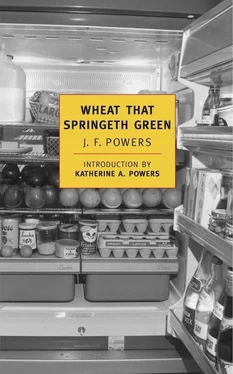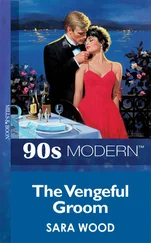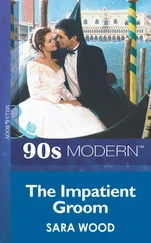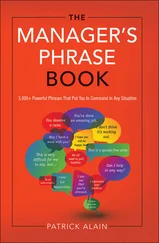J. Powers - Wheat That Springeth Green
Здесь есть возможность читать онлайн «J. Powers - Wheat That Springeth Green» весь текст электронной книги совершенно бесплатно (целиком полную версию без сокращений). В некоторых случаях можно слушать аудио, скачать через торрент в формате fb2 и присутствует краткое содержание. Год выпуска: 2000, Издательство: NYRB Classics, Жанр: Современная проза, на английском языке. Описание произведения, (предисловие) а так же отзывы посетителей доступны на портале библиотеки ЛибКат.
- Название:Wheat That Springeth Green
- Автор:
- Издательство:NYRB Classics
- Жанр:
- Год:2000
- ISBN:нет данных
- Рейтинг книги:5 / 5. Голосов: 1
-
Избранное:Добавить в избранное
- Отзывы:
-
Ваша оценка:
- 100
- 1
- 2
- 3
- 4
- 5
Wheat That Springeth Green: краткое содержание, описание и аннотация
Предлагаем к чтению аннотацию, описание, краткое содержание или предисловие (зависит от того, что написал сам автор книги «Wheat That Springeth Green»). Если вы не нашли необходимую информацию о книге — напишите в комментариях, мы постараемся отыскать её.
Wheat That Springeth Green — читать онлайн бесплатно полную книгу (весь текст) целиком
Ниже представлен текст книги, разбитый по страницам. Система сохранения места последней прочитанной страницы, позволяет с удобством читать онлайн бесплатно книгу «Wheat That Springeth Green», без необходимости каждый раз заново искать на чём Вы остановились. Поставьте закладку, и сможете в любой момент перейти на страницу, на которой закончили чтение.
Интервал:
Закладка:
The next ones to arrive, two country pastors in a dusty Chevrolet equipped with a long waving aerial and an outsize bug screen into which a small yellow bird had flown and stuck as if mounted there, were wary when told by Schwinghammer and others that the Rector wanted the entrance kept clear this year. (“Yeah, sure”—“What about that old heap?”) And seemed to doubt that Lawrence existed and would be right back. (“From parking a car?”—“Yeah, sure.”) The Chevrolet, motor off and radio on (the Twins game), waited, and when a dusty Ford arrived, made common cause with it.
Joe had to leave the scene because Rooney came out of the Administration Building (which Joe had been keeping an eye on) and signaled to him with a card-dealing gesture.
So, that evening and thereafter, as at the last retreat, Joe and Rooney sat down with Monsignor Egan and his set, Fathers Keogh, Kling, and Moore, products of the twenties, solid, pink, white-haired or balding pastors, exactly the sort of men Joe had once scorned — too many like them cluttering up the priesthood, he’d thought — but now thought, when he saw them around a table at a restaurant, or, for that matter, around a green baize table at the seminary with their collars off and, in Kling’s case, shoes, What an impressive group of men! And considered himself fortunate. Playing in ordinary company at the retreat could be debilitating and risky — last year at one of the conferences, which were held in the chapel, a man suffering from poker fatigue had fallen out of his pew — whereas playing with Egan’s set was safe and salubrious: a man had maybe three drinks, began fasting at midnight, closed down at one, had a good night’s sleep, and was ready for morning when it came, early. Joe liked the strict regimen — wished he could run his life on such lines the rest of the year — and he also liked playing in the distinguished visitor’s suite, where the likes of G.K. Chesterton, Jacques Maritain, and Frank Sheed had stayed and where the Rector had put Egan again, with private bath, air conditioning, refrigerator, and glasses , and sent Lawrence up nightly with a platter of snacks.
So there were a number of advantages for Joe and Rooney as members (pro tem) of Egan’s set — whose practice it was, however, to attend every conference, alas.
Father Demetrius, who worked in the peppery, hard-sell style of Walter Winchell, warned the retreatants not to expect much from him in the usual way of retreats, “moral, ascetics, liturgy, what have you,” which sounded promising. A prison chaplain of many years’ standing, Father Demetrius owed his current assignment to the state of the nation, he said. “I’m hot now, and if I know you bankers you’re worried about the rising tide of crime.” Insights, however, positive insights into the rising tide and practical suggestions as to how to stem it were not immediately forthcoming from Father Demetrius.
He devoted his first conference to reading statistics from the FBI and had everybody yawning. While some of the younger men said this was needed — a nonmythological approach to everyday problems — Joe had to admire Father Demetrius for not trying, as so many retreatmasters did, for a knockout in the first round. At the next conference, beginning again with the statement (soon to become tiresome) “The proper study of man is crime,” and citing the case of Cain and Abel (having cited the case of Adam and Eve at the first conference), Father Demetrius told true-life stories from the pen, some of them pretty rough, some merely heartwarming. At the next conference, he told more stories. At the next, more.
The retreatants had expected to hear stories from an ex-chaplain, but not so many. What they came down to was that Father Demetrius, though part of the establishment as chaplain, had been closer to the inmates, the big fish and the small, some of whom had “formed the habit” of saying the rosary under his guidance—“Some, not all, life’s not like that, my friends”—and were now doing very well on the outside, a surprising number as hoteliers, moteliers, and restaurateurs. “Come what may, I’ll never want for bed and board”—this, with a bitter laugh, implied that the retreatants might so want, or that Father Demetrius was having trouble with his superiors. In any case, the man certainly knew a lot about prime cuts, shellfish, bar equipment, laundry service, pilferage, and protection, all matters in which Joe was interested. Most retreatants, however, seemed to feel that Father Demetrius’s stories had little or no application to them — all those breaks, rumbles, and hits, all that gunfire, “Root-a-toot-toot!” But Father Demetrius was there, he said, to shake them up, which he occasionally did—“Floyd, a three-time loser, white slavery, as nice a fella as you’ll ever meet on the outside”—and, sensing their disapproval, would refer them again to the parable of the Pharisee and the publican, associating himself with the humble publican, the retreatants with the proud Pharisee, and pharisaically seeing nothing wrong with that. The retreatants no longer smiled when he called them bankers.
Delinquency, always a problem, was rife that year, claiming those it never had before, iron pastors, responsible first assistants, and the kind of men who take notes (who were spelling each other). Most delinquents had the decency to stay in their rooms, out of sight, during conferences, but some of the younger men, the very ones who’d first said that the retreatmaster was following a course that would soon become clear, and then that he was simply doing his thing (not a bad thing, they said, since the Church was “overstructured”), they were all over the place during conferences, in the Rec Room shooting pool, out on the lake in boats, giving scandal to Lawrence and the kitchen help.
Joe had to keep telling himself how good it would be when the retreat was over, like this life, if one persevered now; that it wasn’t the singer, or even the song, that mattered, that the Church wouldn’t be the Church if she relied upon such things; that what mattered, what was part and parcel of reality, what could always be counted on to show itself in human affairs, the one constant, in which the Church had her reason for being, was the Cross.
It was good to see Egan’s set accepting it, to see those old boys coming and going, never missing a conference, and good to be one of them.
The retreat had been mentioned among them (in Joe’s presence) only once, one night two or three days out, between deals.
“Well, it’s a change,” said Egan.
“That’s what I say,” said Moore.
Keogh nodded.
“Queen bets,” said Kling.
Joe and probably Rooney, in ordinary company, would have criticized the retreatmaster and the Chancery for booking him, but they said nothing, Joe enjoying, after a moment’s discomfort, the strange sensation of not speaking his mind to no avail, and thinking there was something to be said for whatever it was, charity, or despair, or a blend of both — wisdom? — that moved old men to silence.
On the next to last day, the retreat, making for port like a crippled ship, hit a mine: word came that assessments for the ARF — the Archdiocesan Renewal Fund — had gone out from the Chancery, and all hell broke loose.
While the sound of a siren came and went, men milled about in the corridors, going from room to room, drinking from vessels of various kinds — a real glass crisis at the seminary. Of the men who managed to call home (the switchboard was overloaded), some immediately packed up and left, some stayed and raved as they would in their own rectories, some went quietly into shock, some tried to carry it off (“I knew this was coming”). Most were closemouthed about their assessment (as Joe would have been if he’d known his), but some were not. The figures Joe heard were all sky-high and, quite apart from that, some were out of line, causing tension and worse between pastors of similar or adjoining parishes — Joe had to step between Mooney and Rooney, remind them that their quarrel was not with each other but with Toohey and the Chancery. Every pastor (and his flock) was in trouble, for now there would have to be constant strafing from the pulpit, house-to-house searches for pledges, and possibly the use of hardened mercenaries. But there could be none of that in Joe’s parish, or Cooney’s, under their fiscal system (unless they welshed on their parishioners). So Joe and Cooney were in more trouble than most, in that confused and confusing scene.
Читать дальшеИнтервал:
Закладка:
Похожие книги на «Wheat That Springeth Green»
Представляем Вашему вниманию похожие книги на «Wheat That Springeth Green» списком для выбора. Мы отобрали схожую по названию и смыслу литературу в надежде предоставить читателям больше вариантов отыскать новые, интересные, ещё непрочитанные произведения.
Обсуждение, отзывы о книге «Wheat That Springeth Green» и просто собственные мнения читателей. Оставьте ваши комментарии, напишите, что Вы думаете о произведении, его смысле или главных героях. Укажите что конкретно понравилось, а что нет, и почему Вы так считаете.












